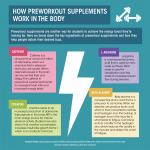Bodybuilders from the 60’s through the early 80’s would drink a cup of coffee before heading to the gym to get a little pre-workout boost of energy.
Nowadays, we have pre-workout gummies and bulk powders, containing caffeine and other substances meant to bolster one’s performance at the gym. Lately in the fitness community, the popularity of pre-workout supplements has been rising, in addition to protein supplements. Some students at UCLA have also started to implement pre-workout supplements into their training in order to aid them in their workout sessions.
In 1982, the first pre-workout supplement Ultimate Orange was created in Venice, California. Since then, pre-workout supplements have become a lot more sophisticated, coming in a variety of flavors and catered for different purposes such as muscle growth, strength, energy and antioxidants.
Some people may opt for coffee or energy drinks as a pre-workout beverage. While the caffeine in the coffee and energy drinks can certainly boost one’s energy levels during a workout, there are other performance-enhancing ingredients in a pre-workout. Besides alertness, pre-workout can also assist in muscle recovery, increased blood flow during exercise and in delaying the onset of muscle fatigue. The most common ingredients that are found in most pre-workout supplements are caffeine, beta-alanine, L-arginine and creatine.
Tommy Ervin, a fourth-year mechanical engineering student, has been a regular consumer of pre-workout supplements since his first year of college.
“The reason why I started using (pre-workout) was the inconsistent sleep (or lack thereof) in college,” said Ervin.
Ervin said he believes pre-workout supplements provide him with more sustained energy throughout his workouts. However, he said the effectiveness of pre-workout is more mental than physical. While pre-workout supplements may not make a huge difference on a daily basis, Ervin said he thinks that its effects are more prominent in the long term for avid bodybuilders like himself.
“Caffeine helps with (leg workouts). When you’re squatting something heavy, it makes it feel more effortless than before,” said Ervin.
Caffeine is a stimulant that increases one’s alertness. The consumption of caffeine leads to increased heart rate and energy levels that allows one to have a more productive workout. Additionally, a study published in the American Journal of Clinical Nutrition found that caffeine likely has fat-burning properties.
“I started taking (pre-workout) to help with lean muscle growth and pre-workout has certain ingredients like caffeine, beta-alanine and citrulline which helps with endurance and provides a bit of an energy boost for workouts,” said Rahul Hingorani, a third-year physics student.
Another important ingredient found in pre-workout supplements is creatine. Creatine leads to an increased production of ATP in the body, which is the main energy source for intense physical activity. This helps enhance performance by providing people with more energy when carrying out endurance and resistance training. Besides increasing available energy in the body, creatine also improves strength and increases muscle size.
Another component commonly found in pre-workout supplements is the non-essential amino acid beta-alanine. While exercising, our muscles produce lactic acid which in turn is converted to lactate and hydrogen ions resulting in tiredness. Beta-alanine then increases the levels of carnosine which serve to lower the acidity in the muscles, enabling the consumer to continue exercising.
Pre-workout supplements also enhance one’s workout by promoting the dilation of blood vessels allowing more oxygen to be delivered to the muscles. The component that is responsible for the widening of blood vessels is L-arginine, which produces nitric oxide that promotes vasodilation and muscle “pumps,” which is the increased muscle size during a workout from the dilation of blood vessels.
While pre-workout supplements are seemingly harmless and beneficial for one’s workouts, there are some potential negative side effects of regularly consuming them. Some pre-workout supplements contain 200 to 400 milligrams of caffeine per serving and this is about the caffeine content of two to four cups of coffee.
Hingorani has been taking pre-workout supplements for almost two years and said he has only had one bad experience with them. He once took a pre-workout supplement that had a higher caffeine content than he was accustomed to, causing him to feel exhausted at the end of his workout.
Consuming too much caffeine can cause one’s heart rate to accelerate and cause jittering and feelings of dizziness. For people who are not accustomed to such high caffeine doses, pre-workout supplements can cause high blood pressure and cardiac arrest in extreme cases.
In order to make up for the subpar taste of pre-workout supplements, manufacturers often add artificial sweeteners. While these artificial sweeteners tend to have minimal calories, they are not necessarily healthy – many of them can have detrimental effects on a consumer’s metabolism, increasing the risk for diabetes.
The increasing popularity of pre-workout supplements could be due to the additional effects of the other compounds found in them. Some pre-workout supplements are also tailored to certain fitness goals such as muscle building or fat loss, which is another reason why students find them attractive. Researchers at the Southern Illinois University Carbondale found that the placebo effect could also be another factor in students choosing to implement pre-workout supplements as it makes them perceive their workouts to be easier.
Sure, there’s a bit of debate surrounding pre-workout supplements. While they do have the potential to enhance one’s workout experience, they should be used in moderation – Ervin said he recommends taking smaller portions than the recommended serving size, and to always read the ingredients to make sure they don’t contain excessive amounts of caffeine or potentially harmful substances.
At the end of the day though, pre-workout supplements are artificial supplements, so it may be better to stick to a cup of coffee as a before the gym pick-me-up, especially for more casual gym rats.
